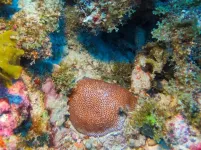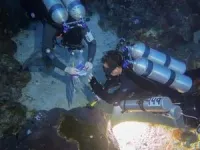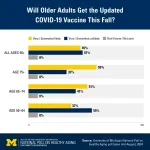(Press-News.org) Since the 1970s, coral reefs in the Florida Keys National Marine Sanctuary (FKNMS) have experienced catastrophic declines in coral cover, with as much as a 50% reduction between 1998 and 2011 alone. Although coral reefs within the FKNMS have been heavily studied, research in the mesophotic zone, which extends from about 100 to 500 feet deep, has historically been more limited in this region.
Mesophotic coral ecosystems have the potential to be buffered from anthropogenic stressors due to their depth and/or relative isolation from shore in many regions. Moreover, mesophotic coral ecosystems may also function as refuges for depth-generalist coral species, providing viable larvae to degraded shallow reefs after isolated episodic disturbance events. In the FKNMS, mesophotic corals have largely avoided the damage caused by bleaching and stony coral tissue loss disease, so they could be a key source of genetic diversity for shallow reefs in the region.
Using the blushing coral star (Stephanocoenia intersepta), found throughout the Western Atlantic, researchers from Florida Atlantic University’s Harbor Branch Oceanographic Institute investigated how coral populations at different depths and locations may be related or “connected” to each other. Using genomic DNA analyses, they explored genetic diversity, differences and connectivity among blushing coral star populations and their symbiotic algal partners using SNP genotyping and ITS2 sequencing.
“The blushing star coral has a wide range both in depth and geography, which makes it a great species for studying how populations at various depths and locations are linked,” said Ryan Eckert, first author and a Ph.D. candidate at FAU Harbor Branch. “Although blushing star corals are less common on shallow reefs throughout their geographic range, they become more abundant and cover more area in the mesophotic zone.”
Results of the study, published in the journal Heredity and featured on the cover, revealed four distinct genetic lineages of blushing star coral. At the sites sampled, the two main genetic lineages of the blushing star coral exhibited strong genetic connectivity between shallow and mesophotic populations. Two shallow-specific lineages showed lower genetic diversity and higher inbreeding as compared to the two depth-generalist lineages. The analysis also indicated that mesophotic reefs are key reproductive sources, especially in the Lower and Upper Keys.
“Corals from deeper, mesophotic zones have a significant potential to help replenish and restore the declining shallow reefs in Florida Keys National Marine Sanctuary,” said Joshua Voss, Ph.D., senior author, principal investigator of the study, and an associate research professor at FAU Harbor Branch. “Plus, important expansions planned in the ‘FKNMS Restoration Blueprint’ include additional protections for mesophotic corals throughout the Keys. Given that coral cover in the region has been decreasing since the 1970s, these findings and new management advances offer promising opportunities for some level of coral reef recovery.”
According to Eckert, the lower diversity and higher levels of inbred individuals across shallow specific lineages are quite worrisome and may portend potential risks moving forward, especially for conservation and restoration efforts.
“However, even if these deeper corals can’t directly repopulate the shallow reefs with viable larvae in the future, they could still be valuable for creating a ‘seed bank’ or for rescue and breeding programs in land-based nurseries to support ongoing and future restoration efforts,” said Eckert.
The distinct cryptic lineages of blushing star coral, with little mixing despite their overlap in the same areas, suggest some level of reproductive isolation. Reproductive isolation between lineages could be due to factors like differing spawning times or high inbreeding rates from localized fertilization. These patterns could be influenced by larval behavioral traits and settlement preferences, contributing to the lower genetic diversity in the shallow blushing coral star populations.
“By recognizing and characterizing the genetic biodiversity across different coral lineages, we can better manage and protect coral populations, especially as we face ongoing and future environmental challenges,” said Voss. “This approach ensures that coral conservation and restoration efforts are informed by a more comprehensive understanding of genetic diversity, essential for maintaining the resilience and health of our coral reef ecosystems.”
The study’s co-authors included Alexis Sturm, Ph.D.; Ashley Carreiro, research laboratory manager; and Allison Klein, a Ph.D. candidate; all from the Voss Laboratory at FAU Harbor Branch.
This research was supported by NOAA Ocean Exploration and Research awarded to Voss
(NA14OAR4320260) through the Cooperative Institute for Ocean Exploration, Research, and Technology, and by the NOAA National Center for Coastal Ocean Science (NA18NOS4780166) awarded to Voss and S. Herrera through the Connectivity of Coral Ecosystems in the Northwest Gulf of Mexico project.
- FAU -
About Harbor Branch Oceanographic Institute:
Founded in 1971, Harbor Branch Oceanographic Institute at Florida Atlantic University is a research community of marine scientists, engineers, educators, and other professionals focused on Ocean Science for a Better World. The institute drives innovation in ocean engineering, at-sea operations, drug discovery and biotechnology from the oceans, coastal ecology and conservation, marine mammal research and conservation, aquaculture, ocean observing systems and marine education. For more information, visit www.fau.edu/hboi.
About Florida Atlantic University:
Florida Atlantic University, established in 1961, officially opened its doors in 1964 as the fifth public university in Florida. Today, the University serves more than 30,000 undergraduate and graduate students across six campuses located along the southeast Florida coast. In recent years, the University has doubled its research expenditures and outpaced its peers in student achievement rates. Through the coexistence of access and excellence, FAU embodies an innovative model where traditional achievement gaps vanish. FAU is designated a Hispanic-serving institution, ranked as a top public university by U.S. News & World Report and a High Research Activity institution by the Carnegie Foundation for the Advancement of Teaching. For more information, visit www.fau.edu.
END
COLUMBUS, Ohio – Americans who say they expect to “never retire” are more likely than others to score low on a measure of financial knowledge, a new study shows.
In a national survey, 20% of those who missed all three financial knowledge questions said they expected they would never retire, compared to 12% who answered all questions correctly, who said they’d likely work well past retirement age.
The study also found that those who were overconfident in their financial knowledge (and those whose low levels of confidence ...
A new peer-reviewed study published in PeerJ Life and Environment has uncovered alarming levels of seafood mislabeling and the use of ambiguous market names in Calgary's seafood market, often concealing species of conservation concern. This research marks the first Canadian study to investigate both invertebrate and finfish mislabeling and the implications of unclear market names.
The study, titled "Mislabeled and Ambiguous Market Names in Invertebrate and Finfish Seafood Conceal Species of Conservation ...
The newly updated COVID-19 vaccine just arrived in pharmacies and clinics nationwide, and a new poll suggests nearly half of people age 50 and older plan to get it. But some older adults with high risk of severe illness appear unlikely to seek the vaccine, and interest varies widely by age group, education level, race and ethnicity, and other factors, the poll shows.
In all, 45% of people age 50 and older say they’re likely to get the updated vaccine, according to the new findings from the University of Michigan’s National Poll on Healthy Aging. The data come from polling done in August 2024, just before the new vaccine was released but ...
Nearly three-quarters of Dutch elite athletes and forty percent of their coaches report sport-related distress. This is one of the findings from a study conducted by Amsterdam UMC together with NOC*NSF, the organisation which represents the Dutch Olympic Committee and the Dutch Sport Federation, published today in BMJ Open Sport & Exercise Medicine.
The most common mental health problem among athletes and coaches is report sport-related distress (73% and 41%, respectively). Unfavorable alcohol consumption that can negatively affect sports performance is also common (52% and 53%). In athletes, ...
New York City (Sep 24, 2024) – Researchers at the Icahn School of Medicine at Mount Sinai have published a pivotal study in Nature Genetics (DOI: 10.1038/s41588-024-01917-1) that sheds light on a novel genetic variant associated with intellectual capacities and educational outcomes. This discovery offers new insights into intellectual disability diagnostics and potential therapeutic avenues.
The study reveals the significant impact of tandem repeats—sequences of DNA where a pattern of nucleotides is repeated multiple times in a head-to-tail manner on a chromosome—on intellectual functioning.
"The ...
Older people are more likely to be influenced by the impulsive financial preferences of others than their younger counterparts, according to a new study.
Research lead by psychologists at the University of Birmingham and the University of Oxford published today in Communications Psychology, reveals that people aged 60 and over are more prone to being influenced by other people when it comes to making impulsive financial decisions compared to young adults aged between 18 -36.
The study set out to explore delayed gratification and how our willingness to wait and social influence develop and differ across our lifespan. To test how age ...
Top ocean experts have published a report that redefines the concept of “sustainable fishing” and proposes 11 “golden rules” that radically challenge the flawed approach that currently prevails in fisheries management.
Published a week before Brussels’ Ocean Week, and a few months before the UN Ocean Conference in Nice, the rules have been devised to put an end to the ongoing destruction of the oceans caused by fishing, and ensure the renewal of abundant fish populations to feed future generations.
They come at a time when scientists have drastically downgraded their assessment of the ocean’s health status.
The rules ...
Experts have used a cutting-edge computational approach to discover the genetic factors that make the bacteria behind cholera so dangerous - which could be key to preventing this deadly disease.
The breakthrough study, published in Nature Communications, is led by Professor Tania Dottorini from the University of Nottingham, in collaboration with Bangladesh’s Institute of Epidemiology, Disease Control and Research (IEDCR), International Centre for Diarrhoeal Disease Research, Bangladesh, and North South University.
The innovative research combines machine learning, genomics, genome-scale metabolic modelling (GSMM), and 3D ...
New research out of Southern Cross University has found previously undocumented variation in coral heat tolerance on Australia's Great Barrier Reef, giving hope that corals’ own genetic resources may hold the key for us to help in its recovery and adaptation.
In a study to be published (at 10am BST, Mon Sept 23, 2024) in Communications Earth and Environment, researchers measured the bleaching thresholds of more than 500 colonies of the table coral, Acropora hyacinthus, using a portable experimental system that was used at sea at 17 reefs spanning the Great Barrier Reef.
The study was led by Southern Cross University PhD candidate Melissa ...
Scientists have conducted the largest and most diverse study to date on how recessive genetic changes contribute to developmental disorders1. They found that most undiagnosed cases that are due to recessive causes are linked to genes we already know about, and suggest a shift in research focus could improve diagnosis rates.
Researchers from the Wellcome Sanger Institute and their collaborators at GeneDx analysed genetic data from nearly 30,000 families affected by developmental disorders – six times more families with greater diversity in ancestral ...




